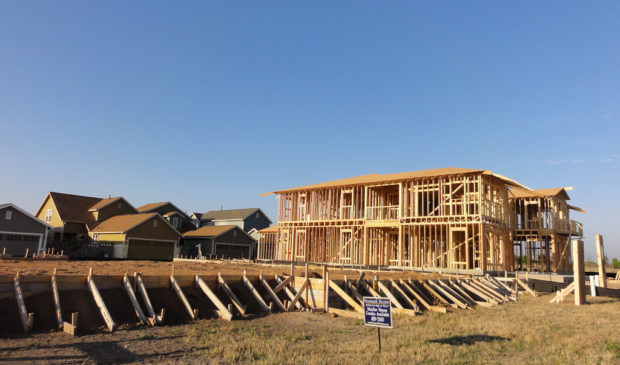Adler to developers: CodeNEXT must provide more housing
Wednesday, March 28, 2018 by
Jack Craver Mayor Steve Adler told members of Austin’s real estate industry Tuesday that the city is making it easier to build and that he hopes the potential overhaul of the city’s Land Development Code will allow for much greater density on the city’s transportation corridors.
At a luncheon hosted by the Real Estate Council of Austin at the JW Marriott downtown, Adler touted improvements in the city’s permitting process. For instance, the average wait time for a site plan consultation with city staff has decreased from 36 minutes to nine minutes, he said.
He described the reform of the Land Development Code through CodeNEXT as an absolute necessity to deal with the city’s two principal issues: affordability and mobility.
There is almost universal agreement, he said, that the current code is unacceptable. It is complicated and contradictory and does not align with the city’s comprehensive plan, Imagine Austin, or its Strategic Housing Blueprint, which calls for an additional 135,000 units by 2025.
Adler said he would not support CodeNEXT unless it amounts to something “better” than the status quo. A better code would be one that “significantly increases density along our corridors” and leads to a “significantly greater number of residential units,” he said.
Unfortunately, said Adler, there are “voices on both sides of the debate that would have us stop” trying to draft a new code. The same “do-nothing voices” that tried to stop the $720 million mobility bond that voters approved in November 2016 are trying to thwart changes to the code, he reasoned.
It would be a major setback, he said, if the city were to completely ditch attempts at revamping the code after the millions of dollars and years of work that has gone into CodeNEXT.
But voicing optimism, Adler said he believed that the great majority of Austinites are interested in making needed changes, as evidenced by the success of the transportation bond as well as by those who are “staying engaged” in the CodeNEXT process, who he referred to as the city’s “true civic heroes.” He specifically expressed appreciation to RECA for staying involved and offering feedback on how to improve the draft.
Referring to the potential prospect of Amazon choosing Austin as the location of its highly anticipated H2 campus, Alder poked fun at speculation that he or other city leaders may have approached the company in private with offers of tax breaks or other incentives.
“I am not involved in secret meetings with Amazon,” he said.
Whether he would welcome Amazon or agree to any incentives, he suggested, depends on how any potential deal might affect the city’s affordability and transportation woes.
“It could be this is a unique opportunity to deal with those,” he said.
Responding to a question from RECA Board Chair Pamela Madere about what the city’s plan was to combat congestion, Adler said that the long-term solution is to get more people “out of cars.”
The appeal of simply building more roads or adding more lanes to existing highways is understandable, said Adler, recalling a recent conversation in which somebody suggested adding four lanes to MoPac Expressway.
If the city were to add lanes to MoPac, predicted Adler, any reduction in congestion would be short-lived. In the long term, he said, it would simply encourage more people to move farther outside of the city and to rely even more on the highway.
“In no time at all, the congestion would be the exact same as today,” he said.
Asked what conflicts he anticipated with the Texas Legislature next year, Adler said that he expected Republicans to once again try to impose property tax limits on cities.
He urged the community to not be distracted by the “misdirection” on the issue of property taxes. The great majority of property tax increases in Austin, he said, were due to the state’s flawed school financing system that gobbles up much of the revenue collected by the Austin Independent School District.
“Capping city taxes means nothing” for Austin taxpayers, compared to reforming the school finance system, said Adler.
Noting that they had run out of time for the interview, Madere commented that the city will also likely face a challenge from the Legislature over the recently enacted paid sick leave ordinance.
Adler hinted he was happy to avoid a subject on which he was likely at odds with his audience: “Whoops, out of time!”
Photo by Garreth Wilcock made available through a Creative Commons license.
The Austin Monitor’s work is made possible by donations from the community. Though our reporting covers donors from time to time, we are careful to keep business and editorial efforts separate while maintaining transparency. A complete list of donors is available here, and our code of ethics is explained here.
You're a community leader
And we’re honored you look to us for serious, in-depth news. You know a strong community needs local and dedicated watchdog reporting. We’re here for you and that won’t change. Now will you take the powerful next step and support our nonprofit news organization?








